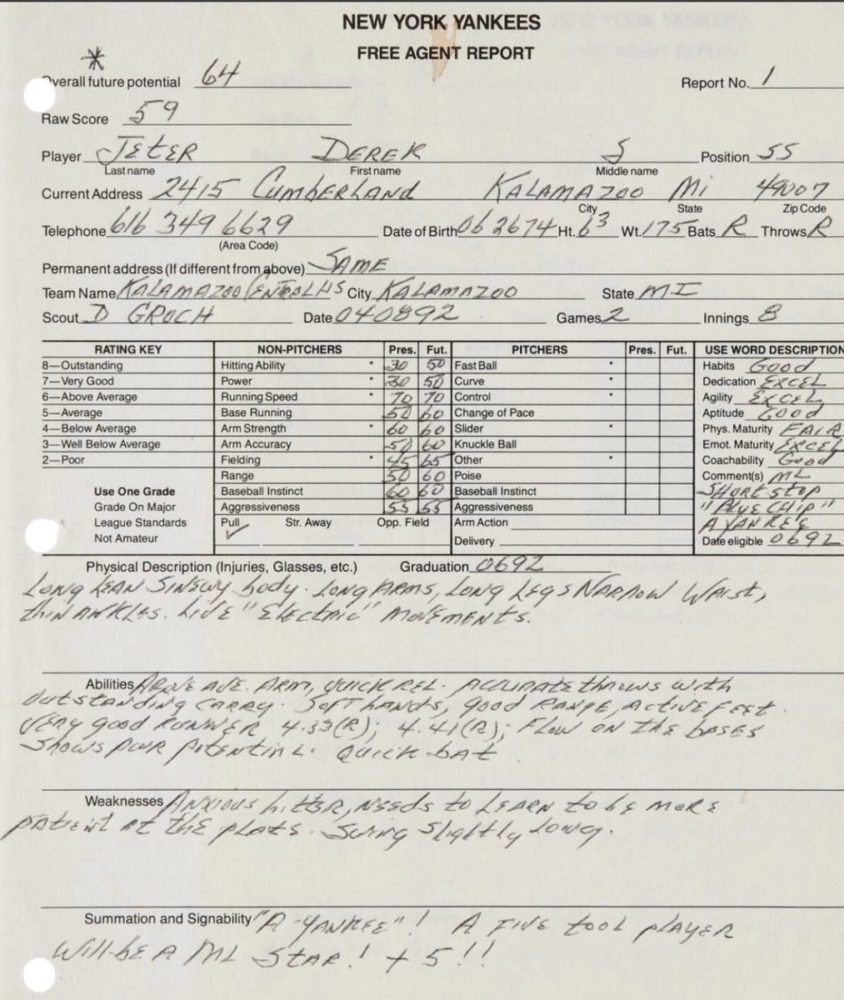The Yankees scout that found Derek Jeter predicted he'd land in Cooperstown
As the legend goes, on a conference call before the 1992 draft with 30 to 40 Yankees officials, Dick Groch -- the scout who “found” Jeter -- famously said this when others expressed concern that Jeter would not sign and go to college instead:
He’s not going to the University of Michigan. The only place Derek Jeter is going is Cooperstown.
That sounds like folklore, but it was just part of the scouting process.
The Art of Confidence
The baseball draft is the biggest crap-shoot out of the major sports. Under the current CBA there are 40-rounds plus supplemental and compensation picks, adding up to over 1,000 players selected each year.
A 2017 study published by the Baseball Research Journal found that about 66% of players drafted and signed in the first round make the major leagues and 47% play 3 or more years. Those percentages are actually higher than I would have guessed (probably due to the Yankees draft history since drafting Jeter). Obviously they fall-off dramatically as you get into the higher rounds, but two-thirds of first round picks appear in the majors. No sure thing, but not bad.
Scouting is where the magic happens though. It's said that scouting is the art of confidence. What do you see, what can you project, and -- most importantly -- how sure are you? Scouts have to "sell" the players they believe in to management.
Talking about the five teams that drafted before the Yankees in '92, Doug Melvin, who used to be a scouting director with the Yankees, said:
You've got to be convincing with your reporting on the player and your selling of the player. Maybe a scout in one of the other cities, Houston or whatever, that liked Jeter wasn't convincing enough or didn't evaluate him properly.
One of those scouts, Hal Newhouser, famously quit after the Astros took Phil Nevin #1 overall instead of Jeter.
I guess Newhouser didn’t “sell” hard enough.
Knowing what is actually behind scouting and drafting a player makes it seem pretty lucky that the Yankees ended up with Derek Jeter.
Who is Dick Groch?
Dick Groch is a veteran scout who now works for the Brewers as a special assistant to the general manager. But in the early ‘90s he was the Yankees scout assigned to the Midwest region.
He was first sold on Jeter’s talent at an All-Star camp held at Western Michigan University in 1991. After he saw Jeter dominate there, he started to follow him -- but not in the typical scout-follows-player kind of way.
Groch watched Jeter from afar. He’d watch in the parking lot sitting in his car and even hid in bushes a few times. He wanted to observe without alerting Jeter of his presence, this way he could see him fail and see how he interacts with his teammates when he doesn’t think there’s a scout around.
Jeter said he knew of Groch, but didn't see him around much and never had a conversation with him. When Groch called Jeter to say the Yankees had picked him, Jeter was surprised.
I didn't think you liked me. I didn't see you that much.
Scouts sometimes build a relationship with the player and family pre-draft to build equity for when it comes time for signing bonus negotiations. That wasn’t Groch’s style, but he and Jeter still had a great relationship after he was officially signed -- which ended up being for $800K, including a $50K equipment donation in athletic equipment to Jeter’s high school, summer leagues and rec programs. Groch said a lot of other 18-year olds ask for a new Mercedes in that spot.

Jeter would sometimes call Groch for advice and reassurance when he was struggling in the minors, and the two have remained close over the years. Groch also introduced Jeter to agent Casey Close, who represented Jeter throughout his career.
Scouting Report
Even if Groch was giving Yankees brass the "hard sell" on Jeter, he no-doubt identified Jeter as a future star.
In the summary section on a Jeter draft report dated April 8, 1992, he wrote: "‘A Yankee!’ A five-tool player. Will be a ML star. +5!!"
"ML" means major league and I’m pretty sure the +5 refers to Jeter’s five tools being at least “plus” grade, which is a 60 on the 20-80 scale.

The “Abilities” section is mostly focused on Jeter’s throwing, range, and speed on the basepaths, but also said he “shows power potential” and has a “quick bat.”
In the “Weakness” section, it says he’s an “Anxious hitter, [who] needs to learn to be more patient at the plate. Swing slightly long.”
Overall he gave Jeter’s future potential a 64 out of 80, meaning he expected Jeter to fall somewhere between a star on his own team and a perennial All-Star player in the league.
Talking about Groch, Brian Cashman said:
Dick has got strong opinions. When he sees something he likes, he’s going to make sure you know it. He’s not afraid to express that. That’s a compliment -- a lot of people don’t have the conviction necessary to do that job.
It was really important that Groch had the conviction because it took some convincing and trust in Groch for the Yankees to draft the 18-year old Jeter. It was especially difficult because Steinbrenner did not like drafting players out of high school and there was no guarantee Jeter would sign.
Close Call
Derek Jeter turning into a Hall of Famer who led the Yankees to 5 championships made it so people know who Dick Groch is now. Part of it is luck that 5 teams didn’t take Jeter.
If the Astros took Jeter and he led them to championships, everyone would call Hal Newhouser a genius and nobody would know that Dick Groch identified the shortstop from Kalamazoo and that the Yankees would have drafted him.
Or, what if the Yankees took Jim Pittsley, a pitcher they were also eyeing at #6? He ended up being drafted by the Royals 17th, had a 6.02 career ERA and was out of the league by 1999.
What if the scout who favored Pittsley won the internal battle over Groch?
Jeter is Groch’s “trump card” now, but the reality is that he was a successful and well-respected scout even before that. Sometimes it doesn't work out though. Groch said he saw every game Joey Votto played for a year leading up to the 2002 draft but nobody knows that because the Reds took him instead.
It really is amazing how things could have turned out if one or two things broke a different way. Luckily for the Yankees they were in a position to be picking 6th, Jeter was on the board, and Groch fought harder than the other scouts.
Podcast - A Brief History: The Jeter Five
You can check out the full story behind the Yankees drafting Jeter and the five players taken ahead of him below.


